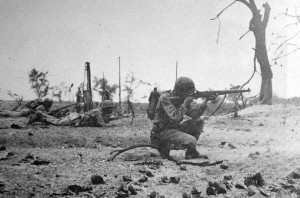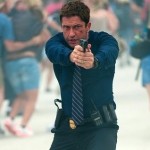 I’ll never forget the day my grandfather told me about the Battle of Peleliu, where he was gravely wounded and won a Bronze Star for Valor.
I’ll never forget the day my grandfather told me about the Battle of Peleliu, where he was gravely wounded and won a Bronze Star for Valor.
He told me the story exactly once. I had known him for my whole life, but had never heard it. I had heard legends and jokes and how he heard my dad had been born as he waited so far away. I don’t know if I had finally earned the right to hear the story of gore and horror and pride or if he just needed to pass it on.
He was elderly by that time and used a wheelchair, except for the day he visited his CO’s grave at Arlington National Cemetery. He was determined to walk as a sign of honor, dammit, and so he staggered down the slick hill as we held our breath in worry that he would fall.
That’s the way he was.
He was a mean, stubborn S.O.B. And he was a great man.
Both things coexisted in him, both attributes cranked up to a huge degree.
Colin Campbell Kelley, USMC, sat with his cane in his lap, his cane he twisted and worried and nearly broke as he told his story in a soft but determined voice.
How I wish I’d recorded that talk, but it was sacred and unexpected as great memories tend to be. And, as with powerful memories, I’m pretty sure I have details wrong even as I have the soul of the memory clearly in my mind.
A 24 year old lieutenant, he led his troop through the coral canyons of the war-desolate Pacific Island of Peleliu. The Japanese had dug into the island, in caves carved out of coral, and would pop up like evil groundhogs to pick off the American troops. When grandad led his platoon into a space between two hills or mounds, the Japanese (Japs, as Grandad always called his adversaries in the war) waited until they were trapped and opened up from the mouth of caves in the rear and side.
There was no retreat. There was no shelter. They were being slaughtered.
My grandfather grabbed another Marine and a bag of grenades and they made an assault on those caves. In the face of machine gun fire, running up to a cave, tossing a grenade, running to the next cave, tossing another. His companion was killed. Somehow Grandad kept going.
It’s a gruesome, brutal business, killing men, and Grandad was proud and mystified and horrified as he told the story. After all those years.
But he eventually was also shot. As he lay there on the ground, shot through the lung and disarmed, a Jap walked up to finish him off. My grandad reached for his own father’s WWI gun strapped to his leg, raised it, and shot the man before passing out.
The triage units on the beach did not attend to him. He was too far gone. They moved on to wounded more likely to survive, another battlefield horror that we can only imagine.
But he survived, survived despite gangrene and losing half a lung. Survived to come home and give his four children hell. Survived to go to law school and sue people, to make a failed play for political relevance, to live a checkered life.
I think his best and worst moment happened on that coral island. Peleliu was never far from him. It was just…more. More real, more vivid, more…moreness, than anything else could ever be. He lived to be 86, but never lived again quite like he did when he was a 24 year old giving himself to save the world.
He survived, he told me as he twisted his cane, his ancient, translucent hands rigid with tension, but he always regretted losing his father’s gun.
I was reminded of Grandad powerfully, reading Marcus Brotherton’s excellent post on Peleliu and surviving intense situations. It’s worth a read.












